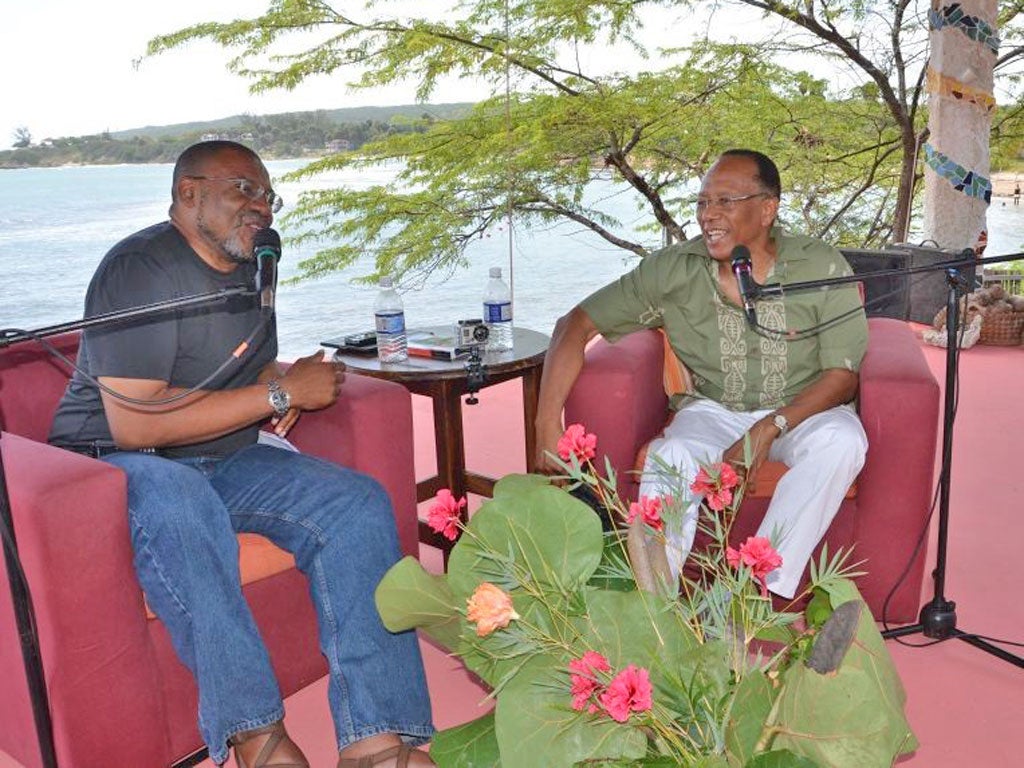Boyd Tonkin: Two big small islands make time for jubilation: different sides of a shared story
The Week In Books

With the restless Caribbean rustling softly at their backs, and flowering trees ablaze in the gardens all around, the poet-painters sat in the cute pavilion that serves as a hotel lobby and spoke about the gulf between the artist's inner vision and the external scene. "Philosophically speaking, I have a problem with Kantian subjectivity," said the veteran Jamaican poet and artist Ralph Thompson. For Kant, the Ding an Sich – the "thing in itself" – can never be known. Yet the artist, in word or image, has no other mission than to make this intangible reality legible and visible. Even when – as Earl McKenzie, another Jamaican poet-philosopher, reminded us – the abundant local reality has "an aversion to straight lines". Jamaicans, as his poem "Against Linearity" puts it, "fear the straight line/ for it is as rigid as death". So their art must catch "the crookedness of life".
More than one island nation has cause for rejoicing this summer. Shortly before our own Diamond Jubilee, I travelled to Treasure Beach, on the south coast of Jamaica, for the Calabash Festival. After a fallow year, this smooth-running celebration of Caribbean literature (and music) returned to mark Jamaica's half-century since independence in 1962. Directed with an enviable amalgam of warmth, zest and efficiency by a triumvirate of writers Colin Channer and Kwame Dawes and film-maker Justine Henzell (her family hotel, Jakes, offers the peerless venue), Calabash made its theme "Jubilation! 50". Songs of freedom sounded out in dozens of blended voices from the Caribbean and beyond - Sadie Jones to Fred D'Aguiar; Olive Senior to Marlon James; and Chimamanda Adichie to ANC veteran Ronnie Kasrils.
Though the Bob Marley spirit tends to loom large at Calabash, Harvard sociologist Orlando Patterson dared to express a heretical preference for reggae pioneers Toots and the Maytals. Patterson, the leading theorist of Atlantic slavery, spoke of the ocean-crossing stamina of Jamaicans and their contagious art: "This island is better known than any other country of its size." He also remembered the uneasily shared past of the two jubilant nations. "If you want to see the wealth of Jamaica, go to Britain. Whenever I go to the Tate Gallery [founded on the Tate & Lyle sugar fortune], I feel a sense of proprietorship."
In a vast, Hay-sized festival marquee, packed from noon to night, an audience of several hundred devoured poetry, prose, debate and music with rapt attention as the waters of Calabash Bay lapped at the sands just behind the podium. Dawes – prolific poet, dramatist, professor and editor – upholds a "reggae aesthetic". But don't mistake that for easy populism. For all the mellow background beats, vernacular tradition and literary ambition mingle as sweetly here as rum and juice in the cocktail bar.
An unscheduled surprise, Linton Kwesi Johnson read one afternoon. As I listened to his wrenchingly beautiful elegy "Reggae fe Dada", I thought again that Johnson truly keeps company with Lorca and Burns.
As for the wrangles of the poet-painters, they brought to mind the metaphysical tinge of so much great art from the modern Caribbean. From Derek Walcott and Wilson Harris to Aubrey Williams and Frank Bowling, writers and painters have grappled with the prodigal complexity of landscapes and histories that can overwhelm with their sinuous, assymetrical diversity. As for me, I managed to follow the twisting paths back for a farewell dinner. "We have a fantastic audience, and a wonderful vibe," as Dawes said in his valediction. "Somehow they transform into a community." Other festivals could learn so much from it.
The author, the academy - and the empty purse
It's not only a Jamaican fate, but it struck me again at Calabash how many fine writers earn their keep thanks to the North American university system. Orlando Patterson was in his youth a brave and gifted novelist: he discussed his The Children of Sisyphus (1964), one of the first works to take Rastafarians seriously – before Bob Marley's cult, when the dreadlocked rebels were a "disgrace to the nation". Patterson also recalled early days at the LSE. Once he visited the great Barbadian novelist George Lamming, and found him in a bedsit at the end of the Northern Line. "Is this what I have to look forward to?" the young hopeful (now a Harvard sage) asked himself. It wasn't, but the fiction – sadly – ceased.
Keep up with Jamaica's Joneses
Before Linton Kwesi Johnson, other poets had transfigured Jamaican speech into lyric verse. As a curtain-raiser to the reading by Sadie Jones (bestselling author of The Outcast and Small Wars), Kwame Dawes recited one of the nation's best-loved poems. Evan Jones's "The Song of the Banana Man" voices a proud smallholder's defiance to a patronising tourist: "Don't cas your eye nor turn your nose,/ Don't judge a man by his patchy clothes,/ I'm a strong man, a proud man, an I'm free,/ Free as dese mountains, free as dis sea... Praise God an m'big right han/ I will live an die a banana man." Poet, screenwriter (of Escape to Victory and Funeral in Berlin), TV director, Evan Jones is the father of Sadie and her novelist sister Melissa (who also read at Calabash). The sisters used to spend summers on the island, at their family farm in the lush hills of Portland. So far, though, this heritage has not entered Sadie's fiction. "I would feel a blank terror if I ever chose Jamaica as a subject," she told me. "I don't feel any sense of entitlement. It's just a huge part of my life – a huge part of who I am."
Join our commenting forum
Join thought-provoking conversations, follow other Independent readers and see their replies
Comments